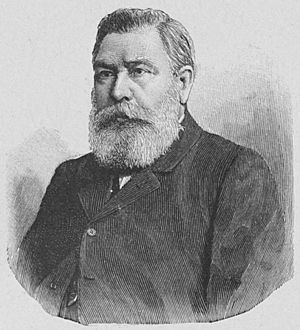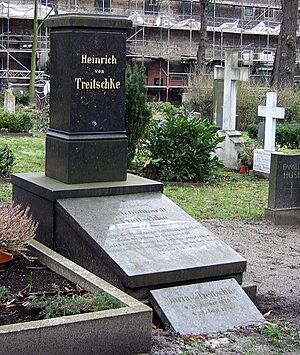Heinrich von Treitschke facts for kids
Quick facts for kids
Heinrich von Treitschke
|
|
|---|---|

Heinrich von Treitschke, around 1895/96.
|
|
| Born | 15 September 1834 |
| Died | 28 April 1896 (aged 61) |
| Nationality | German |
| Occupation | Historian |
| Employer | Freiburg and Berlin Universities |
| Spouse(s) | Emma Von Treitschke |
| Children | Clara Von Tungeln, and Maria Von Treitschke |
Heinrich Gotthard Freiherr von Treitschke (15 September 1834 – 28 April 1896) was an important German historian and political writer. He was also a member of the Reichstag, which was like the parliament of the German Empire at the time. Treitschke was a strong supporter of Germany. He believed Germany should be a powerful nation and expand its influence around the world. He also had strong, often negative, opinions about other groups, including the British Empire, Catholics, Poles, Jews, and socialists within Germany.
Contents
Early Life and His Path to Teaching
Heinrich von Treitschke was born in Dresden. His father was an army officer in the Kingdom of Saxony and later became a military governor. From a young age, Heinrich had a growing hearing problem. Because of this, he couldn't join public service, which was a common path for people from his background.
He studied at the Leipzig and Bonn universities. After finishing his studies, he started working as a private lecturer in Leipzig, teaching history and politics. He became very popular with his students. However, his strong political views made it difficult for the government in Saxony to offer him a full professorship.
At first, Treitschke was a strong Liberal. He hoped that Germany would unite into one single country with a parliamentary government. This meant he wanted a government where elected representatives made decisions. He also wanted the smaller German states to join this new, larger Germany.
Treitschke also believed in ideas that suggested different groups of people were in a "struggle" for power. He thought that Germans were a strong group and should expand their influence, especially into eastern territories. He believed that German ancestors had made these lands strong, which he used to support the idea of Germany expanding further east.
In 1863, he became a professor at the University of Freiburg. In 1866, when the Austro-Prussian War began, he strongly supported the Kingdom of Prussia. He even moved to Berlin, became a Prussian citizen, and started editing a newspaper called Preussische Jahrbücher. He wrote a very strong article asking for the regions of Hanover and Saxony to be taken over by Prussia. This caused problems with his father, who was a friend of the Saxon king. He also strongly criticized Bavaria in 1870. After teaching at the University of Kiel and the University of Heidelberg, he became a professor at Friedrich Wilhelm University (now Humboldt University) in Berlin in 1874.
His Time in Politics
Treitschke became a member of the Reichstag in 1871. He remained a well-known figure in Berlin until his death. Because he was largely deaf during this time, an assistant would sit next to him to write down what was being said so he could follow and join in discussions.
After another historian, Heinrich von Sybel, passed away, Treitschke took over as editor of the Historische Zeitschrift, a history magazine. Over time, he moved away from his earlier Liberal views. He became a strong supporter of the House of Hohenzollern, the royal family of Prussia. He often strongly criticized any ideas or groups that he felt might weaken Germany's growing power.
He supported Chancellor Otto von Bismarck and his plans to control socialists, Poles, and Catholics. Bismarck's efforts were called the Kulturkampf. However, these groups organized themselves and used their voting rights to gain power in the Reichstag, which eventually made Bismarck change his plans.
Treitschke was a big supporter of Germany creating colonies in other parts of the world. He was also a strong critic of the British Empire. His criticisms were popular with some German leaders who wanted Germany to become a global power. As the 19th century ended, he increasingly saw England as a potential enemy of the fast-growing German Empire.
In the Reichstag, he first belonged to the National Liberal Party. But in 1879, he was one of the first to support Bismarck's new trade policies. In his later years, he joined the Moderate Conservatives. However, his deafness kept him from taking a very active role in debates.
Treitschke did not agree with the ideas of the Enlightenment or liberalism, which focused on individual rights and dividing government power. Instead, he believed Germany needed a strong ruler and a powerful army. He worried about "French liberalism" spreading into Germany.
Treitschke was one of the few famous people who supported negative attacks against Jewish people, which became common from 1879 onwards. He claimed that German Jews were not fully becoming part of German culture and society. He also criticized Jewish immigrants coming from Russian Poland. Treitschke made the phrase "Die Juden sind unser Unglück!" ("The Jews are our misfortune!") well-known. This phrase was later used by the very harmful Nazi publication Der Stürmer many years later. Because he was so famous, Treitschke's comments caused a lot of debate and controversy.
The political leaders of Prussia thought highly of Treitschke. Chancellor Bernhard von Bülow even said he kept a copy of Treitschke's book on his desk for many years.
His Death and What He Left Behind
Heinrich von Treitschke passed away in Berlin in 1896 at the age of 61. He is buried at the Alter St.-Matthäus-Kirchhof Berlin.
Throughout his life, Treitschke strongly believed in military power and held views that some groups of people were "superior" or "inferior." He praised the idea of conquering other nations and believed that "Brave peoples expand, cowardly peoples perish." He also claimed that people of African heritage were "inferior."
Treitschke saw history through the eyes of a German nationalist. He focused on times of big political change and was a very patriotic historian who loved Prussia. His most important work was the History of Germany in the Nineteenth Century. The first part was published in 1879, and four more parts came out over 26 years. By the time he died, he had written up to the year 1847.
He also wrote essays about history, biographies, and current political topics. His most important essays were collected in a book called Historische und politische Aufsatze. Some of his more controversial writings were put together in a book called Zehn Jahre deutscher Kämpfe. In 1896, a new book, Deutsche Kämpfe, neue Folge, was published. After he died, his lectures on political subjects were published as Politik.
He also published two small books of poems in 1856 and 1857. His first works translated into English were two short books about the War of 1870. These were called What we demand from France (London, 1870) and The Baptism of Fire of the North German Confederation (1870).
Many famous people were students of Treitschke, including Heinrich Class, Hans Delbrück, W. E. B. Du Bois, Otto Hintze, Max Lenz, Erich Marcks, Friedrich Meinecke, Karl Peters, Gustav Schnürer, Georg Simmel, and Friedrich von Bernhardi. During World War I, many writers, especially in Britain, blamed Bernhardi for creating ideas among German leaders that encouraged war. Historians like Fritz Fischer also believed Treitschke had a major influence on decision-makers before World War I.
A full English translation of Treitschke's Politics was published in London in 1916. A shorter English version of Politics was published in 1963, edited by Hans Kohn.
See also
 In Spanish: Heinrich von Treitschke para niños
In Spanish: Heinrich von Treitschke para niños
- Essentialist nationalism
 | Claudette Colvin |
 | Myrlie Evers-Williams |
 | Alberta Odell Jones |


